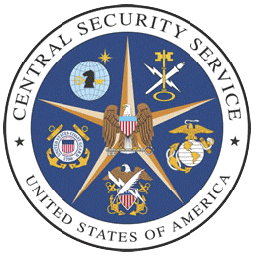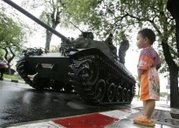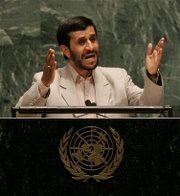Wednesday, September 20, 2006
Thai army calls military rule temporary
By Nopporn Wong-Anan 1 hour, 46 minutes ago
BANGKOK (Reuters) - Thailand's army chief vowed on Wednesday to wipe the political slate clean and return "power to the people" as soon as possible after a bloodless coup against billionaire Prime Minister Thaksin Shinawatra.
Commander-in-chief General Sonthi Boonyaratglin, who had repeatedly dismissed a coup as a way out of a prolonged political stalemate, took power late on Tuesday as head of an interim 'Political Reform Council' run by the military.
"I would like to assure that the Council has no intention of running the country by itself and will return power, under the constitutional monarchy, to the people as soon as possible," he said in a national television address on Wednesday morning.
The Thai baht, one of Asia's strongest currencies this year, suffered its biggest fall in three years within hours of tanks surrounding Government House. Fitch Ratings and Standard & Poor's put Thailand's credit rating on review for possible downgrades.
The stock market was closed on the orders of the coup leaders, who declared a national holiday on Wednesday. Market officials confirmed it would reopen on Thursday.
Commercial banks and some businesses were shuttered in Bangkok, and foreign car manufacturers such as Japan's Nissan Motor Co, one of hundreds of investors in Thailand's export-driven economy, said they had halted operations for a day.
Announcements carried on all television channels said political gatherings of more than five people were banned, but otherwise Bangkok remained calm and quiet, with its notorious traffic jams alleviated by the holiday announcement.
"RAMPANT CORRUPTION"
On Tuesday evening as soldiers took up positions on street corners throughout the capital, a coup spokesman said Thaksin had been ousted to resolve a near year-long political deadlock and to stop "rampant corruption."
Thaksin, who was in New York at the U.N. General Assembly, apparently tried to head off the putsch by phoning a Thai television station to announce a state of emergency but was cut off after 10 minutes.
He then canceled a speech to the
United Nations' name=c1> SEARCHNews News Photos Images Web' name=c3> United Nations scheduled for Wednesday morning Thai time and was due to leave New York at any moment but his aides refused to say where he was going.
One of Thaksin's three children is studying in London, where he also owns a house.
The coup spokesman, retired Lieutenant-General Prapart Sakuntanak, said the army and police were in firm control after
the coup, Thailand's first in 15 years but its 18th since it became a constitutional monarchy in 1932.
Television showed the armed forces chiefs heading in a motorcade to the palace late on Tuesday to report to revered King Bhumibol Adulyadej, images likely to dampen any agitation in the countryside, where support for Thaksin is strong.
However, fears of a counter-coup by Thaksin loyalists within the military and police died down after a senior general said his main deputy, Chidchai Vanasatidya, had been "invited to stay" at Army Headquarters since last night.
Documentaries of the king in the countryside promoting development projects were also broadcast on television, apparently aimed at reinforcing the military's insistence it was acting on behalf of the country and the crown.
Foreign news channels, including CNN and the BBC, were taken off the air immediately after the coup and more than half a day later were still being blocked.
A DIVIDED NATION
The coup was condemned by the United States, the
European Union' name=c1> SEARCHNews News Photos Images Web' name=c3> European Union, Australia and New Zealand as undemocratic.
However its leaders said it had been necessary to resolve the political stalemate that stemmed from a street campaign against telecommunications billionaire Thaksin, accusing him of subverting democracy for the good of his family and friends in big business.
Thaksin argued he was democracy's defender against opponents using unconstitutional means.
"Never in Thai history have the people been so divided," coup spokesman Prapart said. "The majority of people had become suspicious of this administration, which is running the country through rampant corruption."
After mass street protests against him in Bangkok, Thaksin, winner of two election landslides, called a snap poll in April, hoping his rural following would counter his metropolitan foes.
Opposition parties argued he had skewed neutral bodies such as the Election Commission in his favor, however, and boycotted the poll, rendering the result invalid.
Thaksin's Thai Rak Thai (Thais Love Thais) party had been expected to win a re-run tentatively scheduled for late November, increasing pressure on his opponents in the military and the old establishment to remove him by force.
BANGKOK (Reuters) - Thailand's army chief vowed on Wednesday to wipe the political slate clean and return "power to the people" as soon as possible after a bloodless coup against billionaire Prime Minister Thaksin Shinawatra.
Commander-in-chief General Sonthi Boonyaratglin, who had repeatedly dismissed a coup as a way out of a prolonged political stalemate, took power late on Tuesday as head of an interim 'Political Reform Council' run by the military.
"I would like to assure that the Council has no intention of running the country by itself and will return power, under the constitutional monarchy, to the people as soon as possible," he said in a national television address on Wednesday morning.
The Thai baht, one of Asia's strongest currencies this year, suffered its biggest fall in three years within hours of tanks surrounding Government House. Fitch Ratings and Standard & Poor's put Thailand's credit rating on review for possible downgrades.
The stock market was closed on the orders of the coup leaders, who declared a national holiday on Wednesday. Market officials confirmed it would reopen on Thursday.
Commercial banks and some businesses were shuttered in Bangkok, and foreign car manufacturers such as Japan's Nissan Motor Co, one of hundreds of investors in Thailand's export-driven economy, said they had halted operations for a day.
Announcements carried on all television channels said political gatherings of more than five people were banned, but otherwise Bangkok remained calm and quiet, with its notorious traffic jams alleviated by the holiday announcement.
"RAMPANT CORRUPTION"
On Tuesday evening as soldiers took up positions on street corners throughout the capital, a coup spokesman said Thaksin had been ousted to resolve a near year-long political deadlock and to stop "rampant corruption."
Thaksin, who was in New York at the U.N. General Assembly, apparently tried to head off the putsch by phoning a Thai television station to announce a state of emergency but was cut off after 10 minutes.
He then canceled a speech to the
United Nations' name=c1> SEARCHNews News Photos Images Web' name=c3> United Nations scheduled for Wednesday morning Thai time and was due to leave New York at any moment but his aides refused to say where he was going.
One of Thaksin's three children is studying in London, where he also owns a house.
The coup spokesman, retired Lieutenant-General Prapart Sakuntanak, said the army and police were in firm control after
the coup, Thailand's first in 15 years but its 18th since it became a constitutional monarchy in 1932.
Television showed the armed forces chiefs heading in a motorcade to the palace late on Tuesday to report to revered King Bhumibol Adulyadej, images likely to dampen any agitation in the countryside, where support for Thaksin is strong.
However, fears of a counter-coup by Thaksin loyalists within the military and police died down after a senior general said his main deputy, Chidchai Vanasatidya, had been "invited to stay" at Army Headquarters since last night.
Documentaries of the king in the countryside promoting development projects were also broadcast on television, apparently aimed at reinforcing the military's insistence it was acting on behalf of the country and the crown.
Foreign news channels, including CNN and the BBC, were taken off the air immediately after the coup and more than half a day later were still being blocked.
A DIVIDED NATION
The coup was condemned by the United States, the
European Union' name=c1> SEARCHNews News Photos Images Web' name=c3> European Union, Australia and New Zealand as undemocratic.
However its leaders said it had been necessary to resolve the political stalemate that stemmed from a street campaign against telecommunications billionaire Thaksin, accusing him of subverting democracy for the good of his family and friends in big business.
Thaksin argued he was democracy's defender against opponents using unconstitutional means.
"Never in Thai history have the people been so divided," coup spokesman Prapart said. "The majority of people had become suspicious of this administration, which is running the country through rampant corruption."
After mass street protests against him in Bangkok, Thaksin, winner of two election landslides, called a snap poll in April, hoping his rural following would counter his metropolitan foes.
Opposition parties argued he had skewed neutral bodies such as the Election Commission in his favor, however, and boycotted the poll, rendering the result invalid.
Thaksin's Thai Rak Thai (Thais Love Thais) party had been expected to win a re-run tentatively scheduled for late November, increasing pressure on his opponents in the military and the old establishment to remove him by force.
Posted by
Mark E. Towner
at
1:47 AM
0
comments
![]()
Iran leader says U.S abusing U.N. power
By SCHEHEREZADE FARAMARZI, Associated Press Writer 56 minutes ago
UNITED NATIONS - Iranian President Mahmoud Ahmadinejad took aim at U.S. policies in
Iraq' name=c1> SEARCHNews News Photos Images Web' name=c3> Iraq and Lebanon on Tuesday, and accused Washington of abusing its power in the
U.N. Security Council' name=c1> SEARCHNews News Photos Images Web' name=c3> U.N. Security Council to punish others while protecting its own interests and allies.
He addressed the annual U.N. General Assembly hours after
President Bush' name=c1> SEARCHNews News Photos Images Web' name=c3> President Bush spoke to the same forum. But while Ahmadinejad harshly criticized the United States, Bush directed his remarks to the Iranian people in a clear insult to the hard-line government.
In his speech, Bush pointed to the Iranian government's rejection of a Security Council demand to stop enriching uranium by Aug. 31 or face sanctions.
"The greatest obstacle to this future is that your rulers have chosen to deny you liberty and to use your nation's resources to fund terrorism and fuel extremism and pursue nuclear weapons," the U.S. leader said.
"
Iran' name=c1> SEARCHNews News Photos Images Web' name=c3> Iran must abandon its nuclear weapons ambitions," he said. "Despite what the regime tells you, we have no objection to Iran's pursuit of a truly peaceful nuclear power program."
He also said he hoped to see "the day when you can live in freedom, and America and Iran can be good friends and close partners in the cause of peace."
Ahmadinejad insisted that his nation's nuclear activities are "transparent, peaceful and under the watchful eye" of inspectors from the
International Atomic Energy Agency' name=c1> SEARCHNews News Photos Images Web' name=c3> International Atomic Energy Agency, the U.N. nuclear watchdog. He also reiterated his nation's commitment to the Nuclear Nonproliferation Treaty.
Earlier this month, Ahmadinejad proposed a debate with Bush at the General Assembly's ministerial meeting after the White House dismissed a previous TV debate proposal as a "diversion" from serious concerns over Iran's nuclear program.
But even though the two leaders were addressing the same forum, they skipped each other's speeches and managed to avoid direct contact during the ministerial meeting.
Ahmadinejad also accused the United States and Britain of using their veto power on the Security Council to further their own interests and he said it had become an "instrument of threat and coercion."
"If they have differences with a nation or state, they drag it to the Security Council," and assign themselves the roles of "prosecutor, judge and executioner," Ahmadinejad said. "Is this a just order?"
The U.S. and Britain played central roles in helping craft a U.N. Security Council resolution passed in July that gave Iran until Aug. 31 to suspend uranium enrichment and asked the IAEA to report on Tehran's compliance, dangling the threat of sanctions if Iran refused. Tehran made clear even before the deadline expired that it had no intention of suspending uranium enrichment.
The IAEA last week rejected a recent American report on Iran's nuclear capability, saying the Islamic republic has produced material only in small quantities that is far below the level that can be used in nuclear arms.
Ahmadinejad also criticized the Security Council for failing to call for an immediate cease-fire after war broke out between
Israel' name=c1> SEARCHNews News Photos Images Web' name=c3> Israel and the Islamic militant group Hezbollah in Lebanon. A truce was only reached on Aug. 14 to end the 34-day conflict.
"The Security Council sat idly by for so many days, witnessing the cruel scenes of atrocities against the Lebanese ... Why?" asked Ahmadinejad, whose government is one of Hezbollah's main backers.
He said the answer is self-evident: "When the power behind the hostilities is itself a permanent member of the Security Council, how then can this council fulfill its responsibilities."
The United States and Britain refused to call for a cease-fire during the monthlong war between Israel and Hezbollah, declaring it part of war on terror. Only after Israel's failure to defeat Hezbollah and the deaths of nearly 1,000 Lebanese civilians did Washington and London agree to push for a truce by the U.N. Security Council.
The Iranian leader had harsh words about U.S. efforts in Iraq, saying "the occupiers are incapable of establishing security in Iraq" and every day hundreds of people get killed "in cold blood."
Ahmadinejad claimed that numerous terrorists apprehended by the Iraqi government were "let loose under various pretexts by the occupiers."
Domestically, Ahmadinejad, who doesn't enjoy widespread popularity among his people, has been able to use America's uncompromising stand against Iran's nuclear program to his own benefit. Many Iranians, including those who are against the president's domestic policies, support him in his showdown with the United States on the nuclear issue.
In an interview with "NBC Nightly News," Ahmadinejad was asked about Bush's appeal to the Iranian people.
"We have the same desire ... to be together for the cause of world peace," he said through a translator.
"We think that the American people are like our people. They're good people, they support peace, equality and brotherhood," he said.
He said his issue was with the U.S. administration.
"I explicitly say that I am against the policies chosen by the U.S. government to run the world because these policies are moving the world toward war," he said.
Iraq' name=c1> SEARCHNews News Photos Images Web' name=c3> Iraq and Lebanon on Tuesday, and accused Washington of abusing its power in the
U.N. Security Council' name=c1> SEARCHNews News Photos Images Web' name=c3> U.N. Security Council to punish others while protecting its own interests and allies.
He addressed the annual U.N. General Assembly hours after
President Bush' name=c1> SEARCHNews News Photos Images Web' name=c3> President Bush spoke to the same forum. But while Ahmadinejad harshly criticized the United States, Bush directed his remarks to the Iranian people in a clear insult to the hard-line government.
In his speech, Bush pointed to the Iranian government's rejection of a Security Council demand to stop enriching uranium by Aug. 31 or face sanctions.
"The greatest obstacle to this future is that your rulers have chosen to deny you liberty and to use your nation's resources to fund terrorism and fuel extremism and pursue nuclear weapons," the U.S. leader said.
"
Iran' name=c1> SEARCHNews News Photos Images Web' name=c3> Iran must abandon its nuclear weapons ambitions," he said. "Despite what the regime tells you, we have no objection to Iran's pursuit of a truly peaceful nuclear power program."
He also said he hoped to see "the day when you can live in freedom, and America and Iran can be good friends and close partners in the cause of peace."
Ahmadinejad insisted that his nation's nuclear activities are "transparent, peaceful and under the watchful eye" of inspectors from the
International Atomic Energy Agency' name=c1> SEARCHNews News Photos Images Web' name=c3> International Atomic Energy Agency, the U.N. nuclear watchdog. He also reiterated his nation's commitment to the Nuclear Nonproliferation Treaty.
Earlier this month, Ahmadinejad proposed a debate with Bush at the General Assembly's ministerial meeting after the White House dismissed a previous TV debate proposal as a "diversion" from serious concerns over Iran's nuclear program.
But even though the two leaders were addressing the same forum, they skipped each other's speeches and managed to avoid direct contact during the ministerial meeting.
Ahmadinejad also accused the United States and Britain of using their veto power on the Security Council to further their own interests and he said it had become an "instrument of threat and coercion."
"If they have differences with a nation or state, they drag it to the Security Council," and assign themselves the roles of "prosecutor, judge and executioner," Ahmadinejad said. "Is this a just order?"
The U.S. and Britain played central roles in helping craft a U.N. Security Council resolution passed in July that gave Iran until Aug. 31 to suspend uranium enrichment and asked the IAEA to report on Tehran's compliance, dangling the threat of sanctions if Iran refused. Tehran made clear even before the deadline expired that it had no intention of suspending uranium enrichment.
The IAEA last week rejected a recent American report on Iran's nuclear capability, saying the Islamic republic has produced material only in small quantities that is far below the level that can be used in nuclear arms.
Ahmadinejad also criticized the Security Council for failing to call for an immediate cease-fire after war broke out between
Israel' name=c1> SEARCHNews News Photos Images Web' name=c3> Israel and the Islamic militant group Hezbollah in Lebanon. A truce was only reached on Aug. 14 to end the 34-day conflict.
"The Security Council sat idly by for so many days, witnessing the cruel scenes of atrocities against the Lebanese ... Why?" asked Ahmadinejad, whose government is one of Hezbollah's main backers.
He said the answer is self-evident: "When the power behind the hostilities is itself a permanent member of the Security Council, how then can this council fulfill its responsibilities."
The United States and Britain refused to call for a cease-fire during the monthlong war between Israel and Hezbollah, declaring it part of war on terror. Only after Israel's failure to defeat Hezbollah and the deaths of nearly 1,000 Lebanese civilians did Washington and London agree to push for a truce by the U.N. Security Council.
The Iranian leader had harsh words about U.S. efforts in Iraq, saying "the occupiers are incapable of establishing security in Iraq" and every day hundreds of people get killed "in cold blood."
Ahmadinejad claimed that numerous terrorists apprehended by the Iraqi government were "let loose under various pretexts by the occupiers."
Domestically, Ahmadinejad, who doesn't enjoy widespread popularity among his people, has been able to use America's uncompromising stand against Iran's nuclear program to his own benefit. Many Iranians, including those who are against the president's domestic policies, support him in his showdown with the United States on the nuclear issue.
In an interview with "NBC Nightly News," Ahmadinejad was asked about Bush's appeal to the Iranian people.
"We have the same desire ... to be together for the cause of world peace," he said through a translator.
"We think that the American people are like our people. They're good people, they support peace, equality and brotherhood," he said.
He said his issue was with the U.S. administration.
"I explicitly say that I am against the policies chosen by the U.S. government to run the world because these policies are moving the world toward war," he said.
Posted by
Mark E. Towner
at
1:26 AM
0
comments
![]()
Subscribe to:
Comments (Atom)









